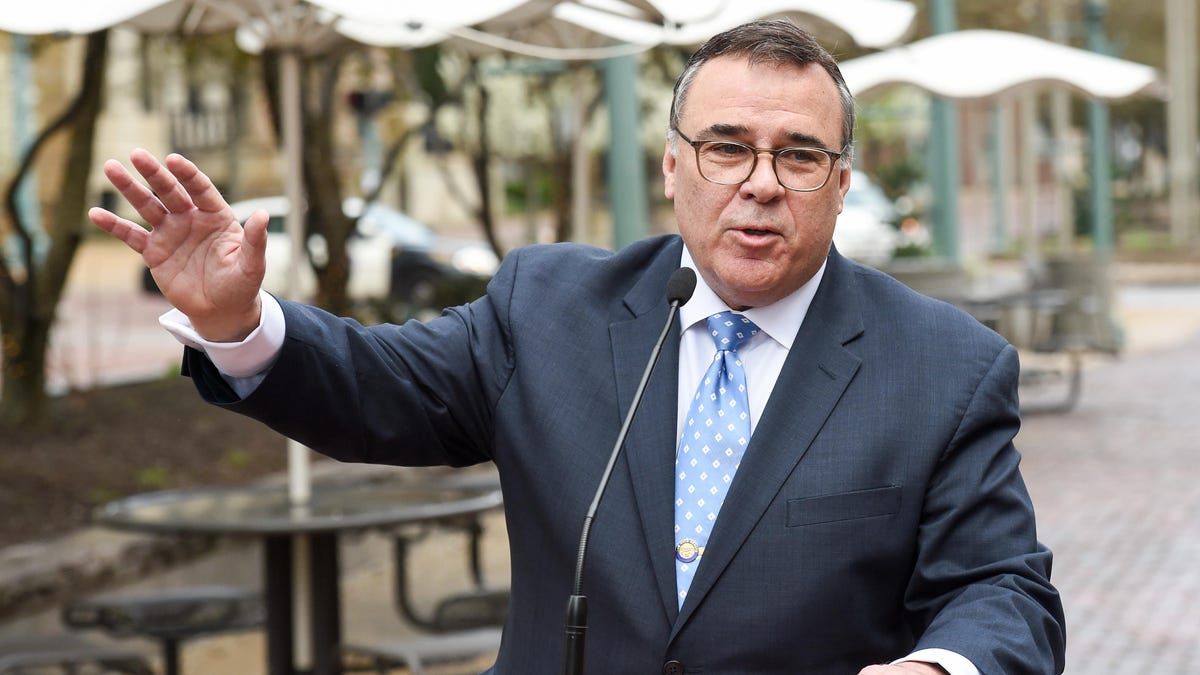World
Timeline: A week after the coup, how has the Niger crisis unfolded?

Here is a look at key events in the week since a military coup took place in the West African country Niger.
Wednesday, July 26
Niger’s presidency said on social media platform X, formerly known as Twitter, that members of the presidential guard tried to move against President Mohamed Bazoum in an apparent coup attempt, warning that the army was ready to attack them if they did not back down.
It said the president and his family were well after news agencies quoted security sources as saying that the guards were holding Bazoum inside the presidential palace in the capital, Niamey.
Members of the presidential guard dispersed supporters of the president as they were trying to approach the presidential complex.
Regional bodies swiftly reacted to the power grab. The West African bloc ECOWAS and the African Union (AU) lashed what they called an “attempted coup d’etat”. ECOWAS called on the plotters to free Bazoum, while the AU urged the “felon” soldiers involved to return to barracks immediately.
Bola Tinubu, president of Nigeria and chair of ECOWAS, said he was already in “close consultation” with other leaders in the region about the situation.
The United States, France, the European Union and the United Nations also condemned the power grab.
A few hours after the news of the president’s detention, a group of soldiers appeared on national television to announce that they had overthrown the government.
“The defence and security forces … have decided to put an end to the regime you are familiar with,” said Niger army spokesman Colonel-Major Amadou Abdramane. He said that the country’s borders were closed, a nationwide curfew was in place and that all institutions of the country had been suspended.
Thursday, July 27
In his first communication since the coup, Bazoum said on X that “hard-won gains will be safeguarded”.
“All Nigeriens who love democracy and freedom would want this,” he said.
Bazoum’s Foreign Minister Hassoumi Massoudou also posted on X, calling on “all democrats and patriots” to make this “perilous adventure” fail.
Meanwhile, more foreign leaders condemned the coup. The German foreign ministry said it was following the continuing events with “very great concern”.
Niger’s army declared allegiance to the defence and security forces that overthrew Bazoum. Army Chief of Staff Abdou Sidikou Issa said the decision was necessary to “avoid a deadly confrontation between the various forces”.
France landed a military aircraft in Niger despite an airspace closure imposed after the announcement of the coup, army Colonel Amadou Abdramane said on state television.
In Niamey, supporters of the coup gathered in front of the National Assembly and some moved on to the headquarters of the governing party, which was ransacked and set on fire, sending plumes of black smoke billowing into the sky.

Friday, July 28
Abdourahmane Tchiani, head of Niger’s presidential guard, named himself head of a transitional government. He made the announcement on state-run television, saying he was the “president of the National Council for the Safeguard of the Homeland”.
The 62-year-old general also said the intervention had been necessary to avoid “the gradual and inevitable demise” of the country.
Colonel Abdramane said on state TV that the constitution had been suspended.
ECOWAS announced it would hold an emergency meeting on Sunday in Abuja, Nigeria’s capital.
French Foreign Minister Catherine Colonna told French media that President Emmanuel Macron had spoken to Bazoum several times.
The French diplomat said France believed there were still possible exits from the crisis, and that the coup did not have any legitimacy.
Wagner mercenary boss Yevgeny Prigozhin, who remains active despite leading a failed mutiny against the Russian army’s top brass last month, hailed the coup and offered his fighters’ services to bring order.
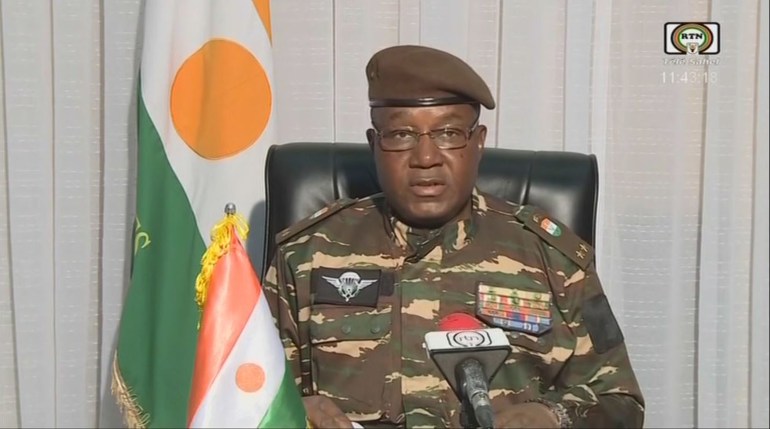
Saturday, July 29
The EU and France cut off financial support to Niger and the United States threatened to do the same.
“In addition to the immediate cessation of budget support, all cooperation actions in the domain of security are suspended indefinitely with immediate effect,” EU foreign policy chief Josep Borrell said in a statement.
According to its website, the EU has allocated 503 million euros ($554m) from its budget to improve governance, education and sustainable growth in Niger over the 2021-2024 period.
The French foreign ministry said France had suspended all development aid and budget support with immediate effect, demanding a prompt return to constitutional order with Bazoum back in charge. French development aid for Niger was at approximately 120 million euros ($130m) in 2022, and was expected to be slightly higher this year.

Sunday, July 30
As ECOWAS leaders gathered in the Nigerian capital for an emergency summit on what actions to take to restore constitutional order in Niger, military leaders warned against any armed intervention.
“We want to once more remind ECOWAS or any other adventurer of our firm determination to defend our homeland,” military spokesperson Colonel Amadou Abdramane said.
Meanwhile, the 15-nation regional bloc demanded that Bazoum be reinstated within a week. Otherwise, it would take “all measures” to restore constitutional order.
“Such measures may include the use of force for this effect,” ECOWAS said in a statement, adding that its defence chiefs were to meet later on Sunday.
It was not clear how ECOWAS could use force. The West African bloc also slapped financial sanctions on the coup leaders and the country, freezing “all commercial and financial transactions” between member states and Niger.
After attending the meeting, Chad’s President Mahamat Idriss Deby travelled to Niger to meet with military leaders involved in coup, and to present initiatives to solve the crisis. He also met Bazoum and later posted an image of his meeting with the deposed leader.
The AU issued a 15-day ultimatum to the military government in Niger to reinstall the democratically elected government.
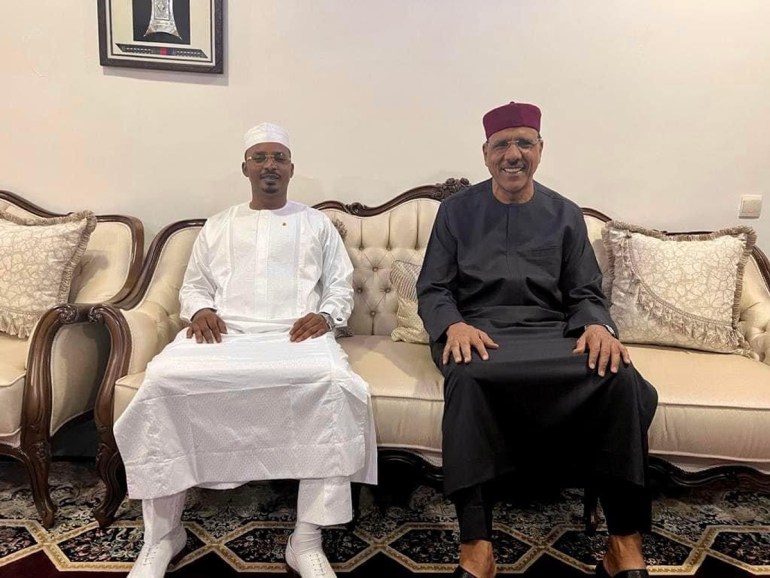
Monday, July 31
The coup leaders alleged that the toppled government had authorised France to carry out an attack on the presidential palace to try to free Bazoum. Abdramane said the authorisation was signed by Foreign Minister Hassoumi Massoudou, acting as prime minister.
Germany said it would halt cooperation with the West African nation with its foreign ministry spokesperson saying that all direct support payments to the central government of Niger would be suspended until further notice.
A planned 30 billion CFA franc ($51m) bond issuance by Niger scheduled in the West African regional debt market was cancelled by the Central Bank of West African States (BCEAO).
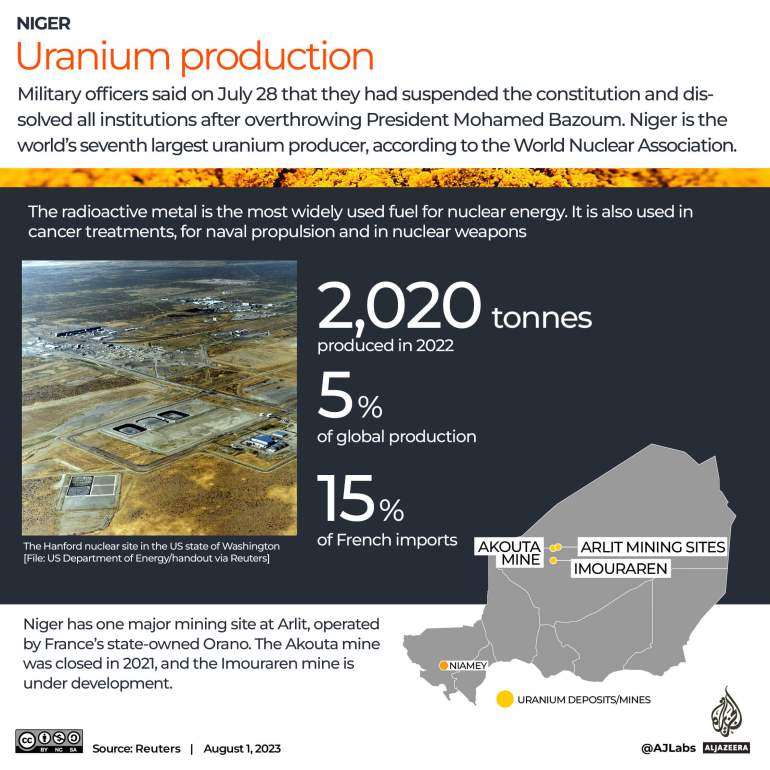
Tuesday, August 1
The price of uranium rose slightly as mining operations continued in the world’s seventh-largest producer of the radioactive metal, but a consultancy warned that prices could rise in the coming weeks.
The spot price of uranium, widely used for nuclear energy and treating cancer, crept up to $56.25 a pound from $56.15 a week earlier, market research firm and consultancy UxC said.
The EU’s nuclear agency, Euratom, said it saw no immediate risks to the EU’s nuclear power production should Niger cut its deliveries of uranium due to the military coup.
Eurotom told the Reuters news agency that the bloc had enough uranium inventories to fuel its nuclear power reactors for three years.

World
Rental home investors poised to benefit as mortgage rates, high home prices sideline buyers in 2025
LOS ANGELES (AP) — Rental homes will remain an attractive option next year to would-be homebuyers sidelined by high mortgage rates and rising home prices, analysts say.
American Homes 4 Rent and Invitation Homes are two big real estate investment trusts poised to benefit from the trend, say analysts at Mizuho Securities USA and Raymond James & Associates.
Their outlooks boil down to a simple thesis: Many Americans will continue to have a difficult time finding a single-family home that they can afford to buy, which will make renting a house an attractive alternative.
It starts with mortgage rates. While the average rate on a 30-year mortgage fell to a two-year low of 6.08% in late September, it’s been mostly rising since then, echoing moves in the 10-year Treasury yield, which lenders use as a guide to pricing home loans.
The yield, which has hovered around 4.4% this week, surged after the presidential election, reflecting expectations among investors that President-elect Donald Trump’s proposed economic policies may widen the federal deficit and crank up inflation.
Analysts at Raymond James and Associates say they see mortgage rates remaining “higher for longer,” given the outcome of the election. Last week, they reiterated their “Outperform” ratings on American Homes 4 Rent and Invitation Homes, noting “we are increasingly confident in the longer-term outlook for single-family rental fundamentals and the industry’s growth prospects.”
They also believe the two companies will continue to benefit from “outsized demographic demand for suburban homes,” and the monthly payment gap between renting and owning a home, which they estimate can be as much as 30% less to rent.
Analysts at Mizuho also expect that homeownership affordability hurdles will maintain “a supportive backdrop” and stoke demand for rental houses, helping American Homes 4 Rent and Invitation Homes to maintain their tenant retention rates.
The companies are averaging higher new and renewal tenant lease rates when compared to several of the largest U.S. apartment owners, including AvalonBay, Equity Residential and Camden Property Trust, according to Mizuho. It has an “Outperform” rating on American Homes 4 Rent and a “Neutral” rating on Invitation Homes.
Shares in Invitation Homes are down 1.2% so far this year, while American Homes 4 Rent is up 4.4%. That’s well below the S&P 500’s 24% gain in the same period.
While individual homeowners and mom-and-pop investors still account for the vast majority of single-family rental homes, homebuilders have stepped up construction of new houses planned for rental communities.
In the third quarter, builders broke ground on about 24,000 single-family homes slated to become rentals. That’s up from 17,000 a year earlier. In the second quarter, single-family rental starts climbed to 25,000, the highest quarterly total going back to at least 1990, according to an analysis of U.S. Census data by the National Association of Home Builders.
World
US briefed Ukraine ahead of Putin's 'experimental Intermediate-range ballistic' attack
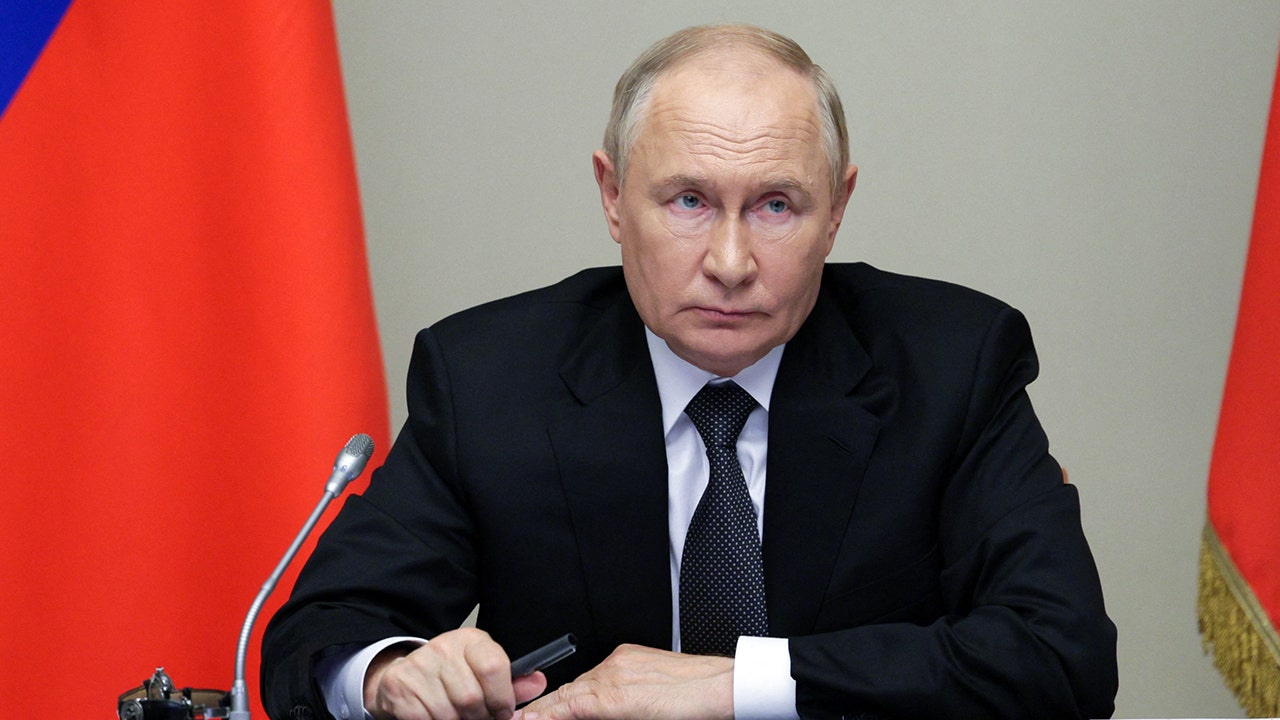
A U.S. official on Thursday confirmed to Fox News Digital that Ukrainian authorities were briefed ahead of Russia’s “experimental Intermediate-range ballistic missile” attack that this type of weapon may be used against Ukraine in order to help it prepare.
Russian President Vladimir Putin confirmed the attack Thursday evening local time in an address to the nation and said it was in direct response to the U.S. and the U.K. jointly approving Ukraine’s use of Western-supplied long-range missiles to target Russia.
It remains unclear if there were any casualties in the attack on the city of Dnipro, which was originally reported as an Intercontinental Ballistic Missile (ICBM) strike, and which would have marked the first time such a weapon had been used during a time of war, sending panic across the globe.
1,000 DAYS OF WAR IN UKRAINE AS ZELENSKYY DOUBLES DOWN ON AERIAL OPTIONS WITH ATACMS, DRONES AND MISSILES
Putin and U.S. sources have since confirmed the strike was not an ICBM, but the Kremlin chief also claimed that the weapon used poses a significant challenge for Western nations.
“The missiles attack targets at a speed of MACH 10. That’s 2.5 miles per second,” Putin said according to a translation. “The world’s current air defense systems and the missile defense systems developed by the Americans in Europe do not intercept such missiles.”
Fox News Digital could not immediately verify whether the U.S. or its NATO allies are capable of defending against this latest missile, dubbed the Oreshnik.
But according to one U.S. official, Putin may be playing up his abilities in a move to intimidate the West and Ukraine.
A Yars intercontinental ballistic missile is test-fired in northwestern Russia on Oct. 29. (Russian Defense Ministry Press Service via AP)
“While we take all threats against Ukraine seriously, it is important to keep a few key facts in mind: Russia likely possesses only a handful of these experimental missiles,” the official told Fox News Digital. “Ukraine has withstood countless attacks from Russia, including from missiles with significantly larger warheads than this weapon.
“Let me be clear: Russia may be seeking to use this capability to try to intimidate Ukraine and its supporters, or generate attention in the information space, but it will not be a game-changer in this conflict,” the official added.
US EMBASSY IN KYIV CLOSED AS ‘POTENTIAL SIGNIFICANT AIR ATTACK’ LOOMS
Following President Biden’s position reversal this week to allow Ukraine to use U.S.-supplied long-range Army Tactical Missile Systems (ATACMS) against the Russian homeland, Kyiv immediately levied strikes against a military arsenal in the Russian region of Bryansk, more than 70 miles from Ukraine’s border.
While Ukrainian troops are the ones to officially fire the sophisticated missiles, the weapons system still relies on U.S. satellites to hit its target — an issue Putin touched on in his unannounced speech Thursday.
“We are testing the Oreshnik missile systems in combat conditions in response to NATO countries’ aggressive actions against Russia. We will decide on the further deployment of intermediate-range and shorter-range missiles depending on the actions of the U.S. and its satellites,” he said.
CLICK TO GET THE FOX NEWS APP

Firefighters work at the site of a Russian missile strike in Dnipro, Ukraine, on Thursday. (Press service of the State Emergency Service of Ukraine in Dnipropetrovsk region/Handout via Reuters)
Putin claimed Russia will alert Ukrainian citizens of an impending attack like the strike he carried out on Thursday, though it remains unclear if he issued a warning to the Ukrainians living in Dnipro.
The Kremlin chief said the “defense industry” was targeted, though images released by the Ukrainian ministry of defense showed what appeared to be civilian infrastructure was also caught in the fray.
The Pentagon on Thursday confirmed that Russia informed the U.S. of the impending attack, which corresponds with information obtained by Fox News Digital, but it is unclear if Moscow clarified which Ukrainian city was the intended target.
A U.S. official told Fox News Digital that the U.S. is committed to helping Ukraine bolster its air defense systems and has done so already by supplying Ukraine with hundreds of additional Patriot and Advanced Medium-Range Air-to-Air Missiles.
World
South Korea says Russia sent North Korea missiles in exchange for troops

South Korea’s national security adviser says North plans to use the weapons to defend its airspace over the capital.
Russia has provided North Korea with anti-air missiles and air defence equipment in return for sending soldiers to support its war against Ukraine, according to a top South Korean official.
Asked what the North stood to gain from dispatching an estimated 10,000 troops to Russia, South Korea’s national security adviser Shin Won-sik said Moscow had given Pyongyang economic and military technology support.
“It is understood that North Korea has been provided with related equipment and anti-aircraft missiles to strengthen Pyongyang’s weak air defence system,” Shin told South Korean broadcaster SBS in an interview aired on Friday.
At a military exhibition in the capital, Pyongyang, North Korean leader Kim Jong Un on Friday called for developing and upgrading “ultra-modern” versions of weaponry, and pledged to keep advancing defence capabilities, state media reported.
Russia this month ratified a landmark mutual defence pact with North Korea as Ukrainian officials reported clashes with Pyongyang’s soldiers on the front lines.
The treaty was signed in Pyongyang in June during a state visit by Russian President Vladimir Putin. It obligates both states to provide military assistance “without delay” in the case of an attack on the other and to cooperate internationally to oppose Western sanctions.
South Korea’s National Intelligence Service told lawmakers this week that the troops deployed to Russia are believed to have been assigned to an airborne brigade and marine corps on the ground, with some of the soldiers having already entered combat, the Yonhap news agency reported.
The intelligence agency also said recently that North Korea had sent more than 13,000 containers of artillery, missiles and other conventional arms to Russia since August 2023 to replenish its dwindling weapons stockpiles.
Experts say Pyongyang could be using Ukraine as a means of realigning foreign policy.
By sending soldiers, North Korea is positioning itself within the Russian war economy as a supplier of weapons, military support and labour – potentially bypassing its traditional ally, neighbour and main trading partner, China, according to analysts.
Russia can also provide North Korea access to its vast natural resources, such as oil and gas, they say.
North Korean Foreign Minister Choe Son Hui recently visited Moscow and said her country would “stand firmly by our Russian comrades until victory day“.
North Korea said last month that any troop deployment to Russia would be “an act conforming with the regulations of international law”, but stopped short of confirming that it had sent soldiers.
The deployment has led to a shift in tone from Seoul, which had so far resisted calls to send weapons to Kyiv. However, President Yoon Suk-yeol indicated South Korea might change its longstanding policy of not providing arms to countries in conflict.
-
Business1 week ago
Column: OpenAI just scored a huge victory in a copyright case … or did it?
-

 Health1 week ago
Health1 week agoBird flu leaves teen in critical condition after country's first reported case
-

 Business6 days ago
Business6 days agoColumn: Molly White's message for journalists going freelance — be ready for the pitfalls
-
World1 week ago
Sarah Palin, NY Times Have Explored Settlement, as Judge Sets Defamation Retrial
-

 Science3 days ago
Science3 days agoTrump nominates Dr. Oz to head Medicare and Medicaid and help take on 'illness industrial complex'
-

 Politics5 days ago
Politics5 days agoTrump taps FCC member Brendan Carr to lead agency: 'Warrior for Free Speech'
-
/cdn.vox-cdn.com/uploads/chorus_asset/file/25739950/247386_Elon_Musk_Open_AI_CVirginia.jpg)
/cdn.vox-cdn.com/uploads/chorus_asset/file/25739950/247386_Elon_Musk_Open_AI_CVirginia.jpg) Technology4 days ago
Technology4 days agoInside Elon Musk’s messy breakup with OpenAI
-

 Lifestyle5 days ago
Lifestyle5 days agoSome in the U.S. farm industry are alarmed by Trump's embrace of RFK Jr. and tariffs




